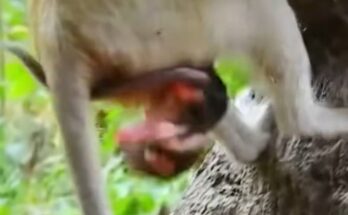The forest awoke to the soft, uncertain cries of a brand-new life. A precious newborn monkey had arrived, tiny and fragile, clinging instinctively to the warm fur of his young mother. His eyes, barely open, blinked against the dappled sunlight filtering through the leaves above. It was a moment of wonder, yet also the beginning of a challenge neither mother nor baby fully understood.
The mother, still youthful herself, had never before experienced the delicate responsibility of raising a child. Instinct guided her hands as she adjusted her hold, but her grip was sometimes awkward, and she would shift uncomfortably when the baby squirmed. Her ears twitched at every sound—an instinctive watchfulness—but her attention would wander, distracted by the rustle of nearby branches or the chatter of her troop.
At first, feeding was the greatest hurdle. The baby’s tiny mouth searched hungrily, nuzzling against her chest, but the mother seemed unsure how to position herself. Sometimes she would pull away too soon, thinking the baby was done, leaving him to cry softly in confusion. The sound tugged at her, though, and she would circle back, trying again, each attempt a little more confident than the last.
Protection, too, was a learning curve. An older, experienced mother in the troop kept a watchful eye, sensing the inexperience of the new mom. When curious juveniles bounded too close, the young mother hesitated—half wanting to keep her baby safe, half unsure how to assert herself. At one point, another monkey reached out to touch the baby, and the mother froze. Only after a moment did she pull her newborn closer, baring her teeth slightly as a quiet warning. It was a small step, but an important one—her instincts sharpening in real time.
Nights brought their own struggles. The baby, unused to the cool air and shadows of the forest, would nestle deeply into her fur, seeking warmth. The mother, restless and fidgeting, shifted positions often, sometimes loosening her hold without realizing. Each time, the baby would squeak in protest, reminding her of his need for constant closeness. Slowly, she began curling her body protectively around him, learning that stillness could be as powerful as movement in keeping him safe.
Days passed, and small victories began to accumulate. She learned how to support his fragile weight when climbing, how to pause at a branch and adjust her hold before leaping to the next. She became quicker to respond when others approached, drawing him close before curious hands could reach him. Feeding became smoother—less a trial-and-error struggle, more a quiet, rhythmic bond between mother and child.
The troop seemed to notice the shift. Where once the young mother had seemed clumsy and hesitant, she now moved with a budding confidence, her baby tucked securely against her. She still made mistakes—occasionally losing her footing or fumbling when the baby squirmed—but each slip was followed by recovery, each doubt replaced by determination.
In the heart of the forest, surrounded by the chorus of life, a once-inexperienced mother was slowly becoming the fierce, tender guardian her newborn needed. The lessons were hard-won, but the reward was immeasurable: a stronger bond, a safer baby, and the first steps of a lifelong journey together.


